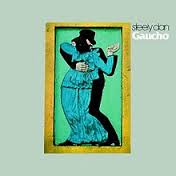By Richard Cromelin
Los Angeles Times
If anyone else had come out with a song called “Gaucho,” the title character would be a man in black fresh off the pampas, reeking of romance and mystery.
 Steely Dan’s gaucho is a comically pathetic figure in a less than romantic situation. The singer’s girlfriend has picked him up and brought him home. There, this interloper — wearing her spangled leather poncho and “snapping his fingers like a fool” — joins us in observing the singer’s exasperated reaction: “No he can’t sleep on the floor/ What do you think I’m yelling for?/ I’ll drop him near the freeway/ Doesn’t he have a home?”
Steely Dan’s gaucho is a comically pathetic figure in a less than romantic situation. The singer’s girlfriend has picked him up and brought him home. There, this interloper — wearing her spangled leather poncho and “snapping his fingers like a fool” — joins us in observing the singer’s exasperated reaction: “No he can’t sleep on the floor/ What do you think I’m yelling for?/ I’ll drop him near the freeway/ Doesn’t he have a home?”
This screwball black comedy typifies Steely Dan’s welcome return to full-blown narratives after the remote, fragmented approach that marked the lyrics of their last album, 1977’s Aja.
And its structure exemplifies the ever increasing sophistication of Steely Dan’s music. Melodically, these are long, complex sentences cleverly played against the punchy, code-like imagery. The album isn’t quite so lush as Aja, but with its burnished gloss and elegant design, it’s even more finely tuned. Mobilized by the light, sure touches of illustrious studio drummers and topped by glistening, jazz-inflected keyboards and spidery guitar lines, this music glides like a snake through the water.
Because it meets the public’s taste for sleep, polished entertainment, Gaucho is likely to surpass Aja’s huge popularity. But we’re dealing with deceptive surfaces here. Donald Fagen and Walter Becker, cerebral subversives that they are, have stocked this alluring pool with all manner of piranhas.
The best songs are also about deceptive surfaces. In their one submission to popular cliche, they use Southern California as the primary symbol of illusory pleasure. “Babylon Sisters” opens the album with “Drive west on Sunset/ To the sea,” bringing us into a hedonistic world where the singer basks in the euphoria of an affair with a couple of California girls. But it’s a short-lived rush. “Here come those Santa Ana winds again,” a female chorus coos with ominous sweetness. “Well I should know by now,” Fagen concedes “… Like a Sunday in T.J./ That it’s cheap but it’s not free.”
Even when no such hard admissions are forthcoming, we can hear the troubling awareness that these are transitory attractions. Sometimes it’s in a melancholy tug in Fagen’s voice, which has found the perfect ratio of honey and brine. Sometimes it’s in a melody line that suddenly opens into a bittersweet configuration.
It’s apparent in the dreamy ennui of “Hey Nineteen’s” rhapsodic refrain: “The Cuervo Gold/ The fine Colombian/ Make tonight a wonderful thing.” Clearly, tequila and marijuana comprise a less than satisfactory solution for this hopeless romance, but that chorus is so seductive that its appeal needs no explanation. Similarly, “Glamour Profession” both embodies and debunks its subject — the treacherous, exhilarating high life of the jet-set drug dealer.
Even with its abundance of ironies, Gaucho is far more intimate and evocative than Aja, whose deliberately sketchy episodes were often cold and distant. Musically, the songs are structural marvels, developing from simple exposition to complex variation. The only real problem is the prominence of the horn charts (which two albums ago would have been stylish, wrenching Larry Carlton guitar bits). These glassy curtains may be thematically appropriate, but they’re also dangerously close to the Valium-jazz that’s enervated so much of today’s pop music.
Lyrically, every verbal stroke is resonant with meaning, evoking nuances of character and situation with small but luminous detail. Because each unit packs so much information, these songs have a shelf-life much longer than that of most contemporary music. If you solve everything on one level, there’s always another to tackle.
Gaucho also contains another piece of bent humor (“My Rival”), a bit of poignant reportage on a casualty of modern pressures (“Third World Man”), and a piece of catchy, propulsive pop that reveals little but conveys much (“Time Out of Mind,” a cryptic, high-spirited outline of some mystical ceremony.)
This brew of pretty poison is close to The Royal Scam as Becker and Fagen’s most effective concoction. Enjoy it as it goes down, but be ready for the aftereffects.

No comments yet.